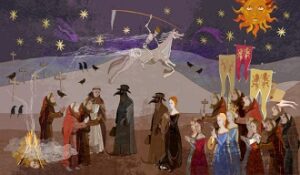
History, the great clearing and parousia
Christmas is near and the birth of Jesus is a historical fact because the Census ordered by the emperor of Rome Caesar Augustus, regarding the date there is controversy for it would be between 4-5 BC, when Quininus was Governor of Syria as described in the Bible (Lc 2.2), but it is certain that the census was carried out and this was precisely the reason why Mary and Joseph went to Bethlehem, where the prophecy said that from there the savior would be born, and thus he “was numbered among men”.
the Census ordered by the emperor of Rome Caesar Augustus, regarding the date there is controversy for it would be between 4-5 BC, when Quininus was Governor of Syria as described in the Bible (Lc 2.2), but it is certain that the census was carried out and this was precisely the reason why Mary and Joseph went to Bethlehem, where the prophecy said that from there the savior would be born, and thus he “was numbered among men”.
History is also punctuated by divine interventions, in the decadence of Rome the monasteries were born, where the culinary culture, the first guilds and offices and also an earlier stage of printed writing is carried out, through the copyists, the first schools and later the first universities, with a strong theological influence as it could not be otherwise, but this is all history, also in the renaissance art and culture had a strong influence (theological).
We enter modernity, the work that we read punctually in this week’s posts “all in the same boat” by Sloterdijk, mentions an important fact, in addition to citing the classic work of the Decamerão by Boccaccio as “small community in the midst of the big disaster” ( Sloterdijk, 1999, p. 75), makes an analysis of the Black Death (which happened in the 130’s) and which devastated Europe with more than 100 million people dead when the population was much smaller than today, and its political influence.
In a footnote he cites the work of Henrik Siewierki (translated by Estação Liberdade in 2001) “A mass for the city of Arras” where he analyzes the psychological and political consequences of the plague, also the psychologist Franz Renggli, in his book Self-destruction by abandonment , developed the hypothesis of the influence on modernity of the plague, and also of the degradation of the mother-child relationship that would have caused a kind of immunological, collective and psychosomatic weakness that favored the virus of that plague.
All this analysis is interesting in the midst of the Pandemic’s return to Europe, while it is undoubtedly a scourge, it can fuel a new clearing on our community, that is, the idea of a mutual and solidary defense in view of a catastrophe even greater than the one we’ve already encountered.
All this analysis is interesting in the midst of the Pandemic’s return to Europe, while it is undoubtedly a scourge, it can fuel a new clearing on our coimmunity (category of Sloterdijk), that is, the idea of a mutual and solidary defense in view of a catastrophe even greater than we have already encountered.
It serves to “make the paths smooth”, as the biblical reading says when John, the son of Zechariah and Elizabeth, announced in the desert using the words of the prophet Isaiah: “this is the voice of the one who cries out in the desert: ‘prepare the way of the Lord , make your paths straight’” (Lk 3,4) and it seems favorable to our time of scourge and desert.
It is important to remember that the first two weeks of Christmas celebrate not the coming of Jesus in Bethlehem, but the Parusia, that is, the preparation for his second coming.









